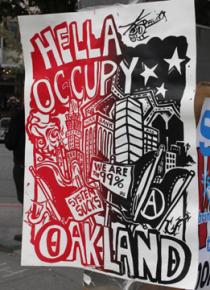I am reposting a series of writings on the intersections of Buddhism and social justice during the Occupy Movement of 2011. These mindful practices are timeless for supporting the challenges and rewards of our roles as organizers and activists.
Today was my third day at Occupy Oakland, an Occupy encampment that started October 10 in front of City Hall in Downtown Oakland.
On my first day, I brought a group of meditators to sit for peace. A mostly white group, one of the people who attended talked to me privately about how they would have felt safer and more comfortable sitting with us had our group represented more diversity. I agreed, and committed to making more connections with communities of color who meditate.
On my second day, I walked in to a scene at the plaza steps where an African American man was screaming at white folks, “Go home!” As a video camera followed him around, he lunged at people as other men held him back and tried to calm him down, worried police would use his anger as an excuse to intervene violently. “You aren’t from here!” he screamed. “You don’t represent Oakland!” An African American woman was also there speaking with calm fierceness about how it was problematic for white people not from Oakland to claim space in the middle of Oakland as “theirs” to occupy. As she described it, this way of thinking isn’t different from the white people who displace people of color through gentrification in Oakland, or the white settlers who stole the land from the Ohlone through colonization.
On my third day, today, I marched through the streets of Oakland with other queers in solidarity with the Occupy encampment. Police showed up at the beginning of the march to escort us through the streets, and a mostly white group of folks told the cops to go away. As the anger escalated, some people of color stepped in to try to mediate. I turned to a friend, “I worry when white folks escalate anger at police, when we aren’t the ones who are going to feel the brunt of police brutality.” We ended the escalation by marching off without police escort. The police escorted anyway, with about 8 cop cars with lights on blocking the whole road behind us. “Leave it to queers,” I said, “to be sure our march comes complete with flashing lights and an entourage.”
 On the march, I spoke with a person who had attended the people of color caucus yesterday. “A bunch of white folks showed up and demanded to be there. Even when we tried to escort them out, they wouldn’t leave.” I shared that I was planning to attend the white anti-racist working group that was meeting this evening, because I’d heard about the incident and had witnessed other incidents myself. “It would be amazing to have a wall of white folks outside of our meeting with signs. ‘Feel excluded? Talk to me about it.’ It would be great for them to be able to express their frustrations, but not in a way that’s really painful in our meeting.”
On the march, I spoke with a person who had attended the people of color caucus yesterday. “A bunch of white folks showed up and demanded to be there. Even when we tried to escort them out, they wouldn’t leave.” I shared that I was planning to attend the white anti-racist working group that was meeting this evening, because I’d heard about the incident and had witnessed other incidents myself. “It would be amazing to have a wall of white folks outside of our meeting with signs. ‘Feel excluded? Talk to me about it.’ It would be great for them to be able to express their frustrations, but not in a way that’s really painful in our meeting.”
I walked up to the meeting for white allies. About eight of us standing were around, introducing ourselves. Then another four walked up. A crowd of eight ambled over and were suddenly twenty strong. We made a circle, and kept expanding it until almost fifty white anti-racist allies were sitting in a circle to discuss how best to support anti-racism and people of color at Occupy Oakland. I loved that folks were thinking about change at all levels: We need to respond to this particular request from the people of color caucus. We need to foster white anti-racist training workshops. We need to engage white people drawn to Occupy Oakland in the struggles of people of color in the surrounding community. We need to support more white anti-racist leaders in taking up major roles within Occupy Oakland.
Oakland is historically a site of significant anti-racist organizing — the Black Panther Party was founded here in 1966. Yet the stories coming out of other Occupy sites also indicate that when we work together under the umbrella of “the 99%,” that we absolutely must do the work to heal racism, classism, sexism, homophobia, ableism, ageism, and other oppression.
We don’t become the 99% by declaring it so. We become the 99% by doing the work to heal what has previously divided us.
Leave a Reply